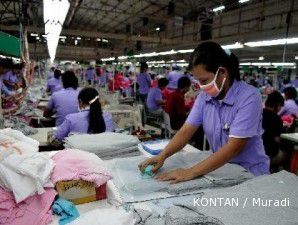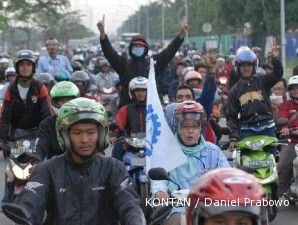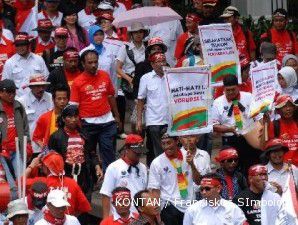JAKARTA. The government together with employers and labor unions will carry out a comprehensive evaluation of the remuneration system and other contentious issues pertinent to the 2003 Labor Law in a bid to calm down mounting industrial conflict in numerous regions.
“The Manpower and Transmigration Ministry will evaluate the remuneration system, including Ministerial Decree No 17/2005 on 46 components composing of decent wages, with employers and labor unions in the immediate future. This is important to avoid any misinterpretations either from labor unions and employers in setting the provincial minimum wage and decent salaries at present,” Manpower and Transmigration Minister Muhaimin Iskandar said when he was asked to comment on the mounting labor union movement in several provinces, here on Tuesday.
He said he had let labor unions and employers know about the planned evaluation in a three-party meeting with the Indonesian Employers’ Association (Apindo) and labor unions here on Monday.
The minister also said that the government, employers and labor unions would also evaluate outsourcing, which labor unions have called a form of modern slavery because workers face legal uncertainties and job insecurity.
He said that the government could no longer unilaterally determine the remuneration system and the decent salaries, as had been shown by the mounting opposition to the minimum wages, which were approved by governors, mayors and regents.
“The evaluation of all new rulings on national remuneration systems, including provincial minimum wages, outsourcing and others that have triggered industrial conflicts is urgent in order to provide legal certainty for either employers and workers and to calm down the mounting industrial dispute,” he said.
Workers in Banten and North Sumatra have stayed away from their workplaces and have spilled out onto the streets over the past few days, demanding that the government annul the recently approved provincial minimum wages in the provinces after workers in Bekasi and Cikarang won approval from local employers and regional heads to increase minimum wages by almost 16 percent to 1,491,000 for general workers.
Previously, workers in industrial estates in Batam, Riau islands, staged violent rallies, clashing with the police in protest of the minimum wages in the province, but the provincial government refuted the workers’ demands, deferring to pressure from labor unions and employers.
Employers and labor unions have showed mixed reactions to the government’s plan to revise the remuneration system and outsourcing practice, with unionists demanding an immediate revision of the ministerial decree on the 46 components, which they said were no longer relevant.
All-Indonesian Workers Organization (OPSI) secretary-general Timbul Siregar said workers in Jakarta and surrounding areas would rally on the streets of Jakarta on Feb. 9 to demand an immediate revision of the 2005 Ministerial Decree and request the compliance of the government and employers with the Constitutional Court’s recent ruling on outsourcing.
“All labor unions are of the same opinion that the monthly provincial minimum wage and outsourcing systems constitute modern slavery, which has been established by the government in its conspiracy with businesspeople,” he said, adding that all labor unions had to be involved in the planned revision of the contentious rulings.
Chairman of the Asia-Pacific Regional Committee of the International Transport Workers’ Federation (ITF) Hanafi Rustandi concurred and said that the newly set provincial minimum wages were too low while the outsourcing practice introduced by the World Bank in the past had created job insecurity among workers.
He questioned the government’s commitment to protecting workers, citing the government’s decision to set a Rp 1.3 million minimum wage in Jakarta, arguing that this amount would not enable a single worker to survive or meet his/her monthly basic needs in the capital city.
Hanafi, also chairman of the Indonesian Seafarers’ Association (KPI), said that the government should give workers and their employers the chance to determine sectorial minimum wages because conditions differed between sectors.
“The minimum wage in the transportation sector should be set at Rp 3 million to allow them to revive their purchasing power,” he said.
Deputy chairman of Apindo Hasanuddin Rahman opposed the planned revision of the contentious rulings on remuneration and outsourcing, saying that many investors would relocate to other countries if the current remuneration system was revised.
“The provincial minimum wage level is quite relative. It is relatively high compared to the increasing number of jobless people who have survived unemployment. But it’s too low compared to the salaries of bank executives,” he said.
He also blamed the mounting industrial conflict on regional heads who had used the labor issues to win political support in local elections and had indirectly encouraged workers to protest the minimum wages. (Ridwan Max Sijabat/The Jakarta Post)
Govt to revise remuneration system
February 01, 2012, 09.24 AM
/2012/02/01/1850650567.jpg)
ILUSTRASI. Promo A&W 12-14 Februari 2021 menawarkan paket menu mulai harga Rp 8.000 – Rp 125.500. Dok: Instagram A&W
Reporter: Edy Can
| Editor: Edy Can
Latest News
-
March 02, 2026, 04.45 PM
Indonesia has Seized 5 Million Hectares of Palm Oil Plantations, Task Force Says
-
March 02, 2026, 01.10 PM
Asian Assets Slide as Mideast Strikes Spark Oil Spike, Haven Rush
-
March 02, 2026, 10.49 AM
Bank Indonesia Monitoring Market Movements in Response to Conflict in Middle East
-
February 25, 2026, 08.28 PM
Inpex to Solicit Bids for Construction of Indonesia's Abadi LNG Project in Mid-2026
-
February 24, 2026, 03.38 PM
Eni to Reach Final Investment Decision for Indonesia Gas Projects Next Month
-
February 24, 2026, 01.00 PM
Asia Stocks Try to Steady after Wall Street Selloff Sims Mood
-
February 23, 2026, 04.50 PM
Wall Street Futures and Dollar Slide on Trump Tariff Tumult
-
February 23, 2026, 02.17 PM
Indonesia's Government Spending Jumps 26% in January 2026
-
February 23, 2026, 01.47 PM
Indonesia's Government Spending Jumps 26% in January












